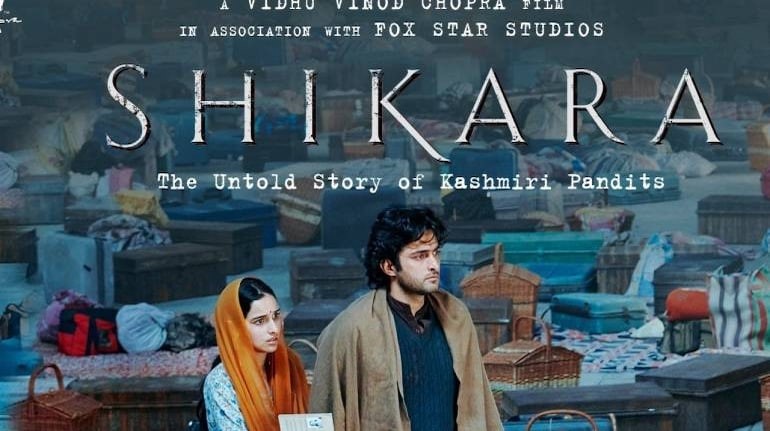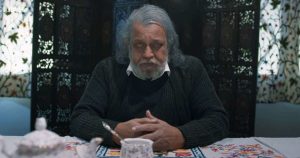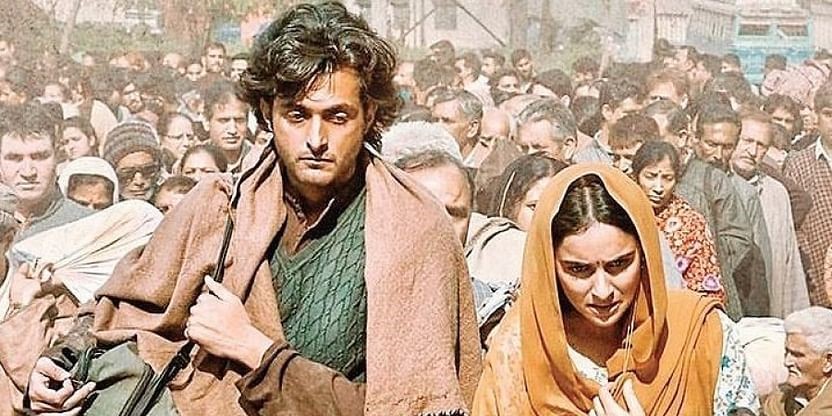
Shikara on Amazon Prime too fails to tell the 'true' story of Kashmiri Pandits
Vidhu Vinod Chopra's 'Shikara' misses the opportunity to tell the true story of the displaced Kashmiri Pandits. If 'The Kashmir Files' is about hate, 'Shikara' fails to do justice to the Kashmiri Pandit issue as it ignores reality to focus on a vapid love story

The agony and anguish displaced Kashmiri Pandits must have undergone 30 years ago has probably sunk into the consciousness of every Indian today. (Thanks to the power of Bollywood). Abruptly uprooted from their well-settled lives in Kashmir, thousands (numbers range from 60,000 [official figures] to 5 lakh), were forced to flee their homes in Kashmir.
Moved to makeshift refugee camps, they waited in vain for the government and the courts to give them justice. In October 2021, Kashmiri Pandits finally did get some form of “divine justice” in one case at least, when an arrested Lashkar-e-Taiba (LeT) terrorist, Zia Mustafa, was killed in a militant firing in Poonch. He was the one responsible for gruesomely shooting down 24 Kashmiri Pandits, including 11 women and two children, in the Nadimarg village of Shopian on March 23, 2003.
This massacre is shown in great detail as the climax scene in Vivek Agnihotri’s The Kashmir Files, leaving audiences in the theatre disturbed and shaken. He also throws in a chilling scene of a Kashmiri Pandit woman being cut while she is alive into two with a mechanical saw. An atrocity that was reportedly committed against a librarian, Girija Tickoo, after she was gang-raped by five militants in another incident.
However, the director takes the Nadimarg massacre and other such tragic events that forced Kashmiri Pandits to flee from their homes in 1990 and crafts them into a hate tale, tackily strung together with key killings in the valley with the purpose of stoking more bitterness.
Besides accusing the media for selling out, the intellectuals (particularly JNU professors) for manipulating innocent students to take the side of terrorists in Kashmir, and Farooq Abdullah for colluding with terrorists and brushing the plight of Kashmiri Pandits under the carpet, he does not spare common Kashmiris as well. Agnihotri, who had earlier made Tashkent Files on the mystery surrounding former Prime Minister Lal Bahadur Shastri’s death and a titillating flick called Hate Story, twists facts and comes up with a hodgepodge narration to primarily convey that Pandits were victims of a holocaust and Kashmiris deserved to have Article 370 revoked.

In the film, loudspeakers in mosques blaring messages asking Pandits to either “convert, leave or die” (and leave the Hindu women behind) are played repeatedly, and it is full of weakly-etched characters. Mithun Chakraborty, who plays an ineffective IAS officer, looks alternatively glum and angry, grimly delivering lines such as, ‘this is a genocide not an exodus’!
Even as his son has just been brutally gunned down by a terrorist and his daughter-in-law forced to eat rice soaked in her husband’s blood, Anupam Kher reels of statistics on the phone to his friend Mithun, on the number of Kashmiri Pandits being evicted from their homes. The dialogues are stagy and farcical. Surely, Kashmiri Pandits deserve a better rendition of their story, a more nuanced and cogent handling based on all the complex factors at play in the troubled region of Kashmir.
Shikara – yet another film on Kashmir Pandits

Yet another film on the ‘untold story of Kashmir Pandits’ – Vidhu Vidhu Chopra’s Shikara (2020) – is currently streaming on Amazon Prime Video. But, like The Kashmir Files, this film, which flopped on the box-office, also fails to do justice to the Kashmiri Pandit issue and ignores reality to focus on a vapid love story. Also, Chopra’s intrinsic message to forgive what happened and move on, did not go down well with people when it hit the theatres. In fact, an upset Kashmiri Pandit ticked him off at a screening for “commercialising” their pain.
Also read: ‘The Kashmir Files’ still going steady, crosses ₹100 crore-mark
Though, it is based on the exodus of Kashmiri Pandits from Kashmir, Shikara largely skims the surface of the politics in the region. There is a scene in which posters are pasted on trees asking Indians to leave Kashmir – ‘India chale jao’. And, in one of the scenes, there’s a speech by Benazir Bhutto raising slogans of aazaadi in support of the militants in Kashmir being played on on a black and white TV in the background. The politics is incidental, the love story is what matters most for Chopra, who has given us memorable films like Parinda (1989), Parineeta (2005) and Khamosh (1986) and produced films like 3 Idiots (2009) and Munnabhai MBBS (2003).
Kashmiri Pandits Shiv Kumar and Shanti Dhar (played by newcomers Aadil Khan and Sadia) fall in love and get married. This ‘perfect’ gentle couple together build a beautiful home called Shikara and there is nothing much to disturb this paradise, as they exchange tender sweet nothings and tuck into their roghan ghosh.
At the end of 1989, when Shiv’s best friend Lateef’s father is killed in an encounter between the Indian army and militants, the Dhars’ happy life turns upside down. A few weeks later, the Islamist militants bay for the blood of Kashmiri Hindus and Shiv and Shanti are forced to abandon their home and flee to Jammu as refugees. And, there they wait for the next 30 years hoping to return to Shikara one day. Their life goes by in the refugee camp, with Shiv teaching refugee children and writing letters to the American president.

Somehow, the filmmaker’s creative ploy to have the protagonist writing letters to the American president, (like SRK goes in search of the American president in My Name is Khan) since he believes America is responsible for arming the militants and is the culprit behind the problems in the valley, just doesn’t work. Chopra clearly wanted to pin the blame on an ‘outsider’ to steer clear of any trouble from the ruling party, who anyway ignored the film.
There are a few high points in the film. Cinematographer Rangarajan Ramabadran’s stunning night panoramic shots of a long train of cars, trucks and buses filled with people and their paltry belongings slowly winding their way on the hilly roads to Jammu, are haunting. The mood of the pain of this displaced community heightened by the music score is palpable.
Just like The Kashmir Files, Shikara too does not talk about the alleged human rights violations by the army, or the security personnel, or the collateral damage to other communities in Kashmir who have also suffered due to the militancy. Neither does it talk about the machinations of political parties of all hues who have also let Kashmir down. What you get here is a 1990 love story shot in scenic Kashmir.
There is one poignant scene however when the refugee couple escorted by the army return to Kashmir for a brief visit. Driving into Srinagar, an emotionally-wrought Shiv recites a poem written by Irshad Kamil, which expresses his longing and love of his hometown. Few lines go like this:

Ae wadi shehzadi bolo kaisi ho?
Kya ab bhi wahan seher shikara karte hai?
Chaar chinar pe waqt guzara karte hain
Kya ab bhi woh jheel barf ho jaati hai?
Jispe bachche khel khilara karte hai
Ae wadi shehzadi bolo kaisi ho?…
(Oh queen of the valley, tell me how you are?
Are the shikaras still roaming on the lake?
Are you spending time at Char Chinar?
Does the Dal lake still freeze over,
in which children play about?
Oh queen of the valley, tell me how are you?)
Unlike Agnihotri, Chopra has a cinematic sense that comes through in the film and it is not shoddily made like The Kashmir Files. But Shikhara just sprints the couple far away from reality and focuses on their story of survival and love. There have been acclaimed works on the partition like Govind Nihalani’s Tamas (which had the BJP up in arms); David Attenborough’s Gandhi; Deepa Mehta’s Earth and the classic Garm Hawa, surely, we can have a better film capturing the plight of the Kashmiri Pandits? However, Chopra seems to have his heart in the right place wanting to tell the story of Kashmiri Pandits for the sake of his mother Shanthi Devi, who had to flee Kashmir in 1989 and “could never return”.
Stung by the criticism that he was trying to commercialise the Kashmir Hindu problem, he wrote a letter to young Indians on his Facebook page at that time: “The movie (Shikara) is my truth. It’s my mother’s truth. It’s my co-writer Rahul Pandita’s truth. This is the truth of a community which despite going through such trauma did not pick up a gun or spread hate.” (A point that is grist for another movie)
According to the director, Shikara is an attempt to do the same, to speak of unimaginable pain without sowing the seeds of violence and animosity. And, to begin a conversation that will hopefully enable Kashmiri Pandits to return to Kashmir, said Chopra adding that he has seen his home destroyed by hate. “Do not let it consume you. I want you to have a future that is different from my past,” he concluded. His sincerity cannot be discounted and better to portray love than unbridled hate but he did miss the opportunity to tell the ‘true’ real story of displaced Kashmiri Pandits.


